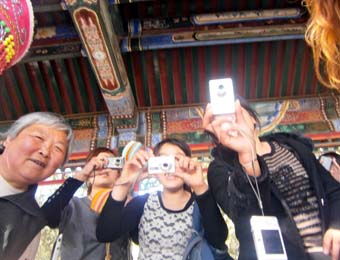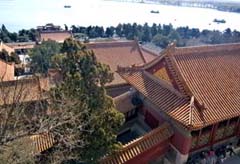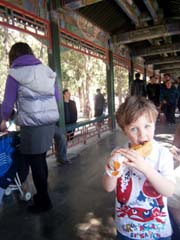
The Long Corridor:
How One American Adjusts to Living in China
| published September 19, 2015 | By Michael Bush, Thursday Review contributor
One important thing you have to understand about living in China as a Westerner is that you are an oddity. You are different. You look strange. You talk funny. You’re probably fat by their standards.
And you are basically a sideshow attraction. People will often stare at you. They will talk about you like you aren’t there, regardless of whether or not you can understand them. The locals will, in most cases, not lend any assistance should you find yourself in need of any, but merely watch your struggles and instead talk to each other about how you really should be handling the situation.
In your first months, you will find everything so very different than you thought it would be. There are more cars than you pictured. There are taller buildings than you had imagined. There is a good deal more public urination than you’re comfortable with. The food is nothing like orange chicken.
The culture shock is real and visceral, and anyone who says it isn’t is only trying to be cool to impress you. If you hear someone say, “I adjusted in no time…it was easy,” from any American or European in regards to living in China, they are lying to you. It is not easy, and it takes time to adjust.
But, that’s not to say that it is impossible. On the contrary, living in China is quite simple once you learn the basic rules and how to adapt to certain decidedly non-American idiosyncrasies.
For example, locals typically don’t use diapers for their babies. This means constant attention being paid to infants and toddlers, looking for telltale signs of Number One or Number Two. Once these signs are detected, the job is to find a place for the baby to…well, relieve his or herself. The bushes, the grass, a fish pond, water drain on the sidewalk, the sidewalk itself, a trashcan, an empty noodle container taken from the trashcan, the floor of a metro train, an elevator…these are all possible receptacles for both Numbers One and Two.
It may sound disgusting to you, but it's run of the mill activity in modern day China. This type of behavior, while unsanitary (and generally frowned upon by a large portion of the younger generation), actually leads to Chinese children being potty trained earlier than Western babies. The kids learn their own signs of imminent eruption because the parents are on high lookout for them, too.
One sunny afternoon, my family and I were touring the Summer Palace, which is located in the Haidian District, a northern suburb of Beijing. This beautiful 720 acre park was originally called the Garden of Clear Ripples, and built in 1750 at the behest of Emperor Qianlong in order to celebrate his mother’s birthday.

Through the years, it was often used as a retreat from the bustling city for the Emperors and Empresses alike. A nice cooling breeze often floats across Kunming Lake to Longevity Hill, where you will find tall, ancient pine trees and cypresses amidst grand palaces, gardens, temples, pavilions, and the world’s longest painted corridor.
It’s an absolutely breathtaking area. I’ve been there several times, and still have not seen all of the Summer Palace. History oozes out of every single building, stone, and sculpture at this wonderful UNESCO World Heritage Site.
During the war of 1860, often called the Second Opium War, the Summer Palace was tragically burned to the ground by British and French forces. However, by order of Empress Dowager Cixi, it was rebuilt on the original foundation in 1886 and still to this day is maintained with excellent upkeep.

It was in the world’s longest painted corridor, appropriately enough called the Long Corridor, where my family had our first real encounter with Chinese babies and their peculiar toilet training.
As I said, it was a very sunny afternoon in the Summer Palace and we had been walking for hours. It was time for a break. About halfway down the Long Corridor we found a shop with some snacks and drinks for sale. My wife, our son, and I stopped at the store hoping to find something refreshing.
We were still very new to China at this point. Since then, we lived in the Middle Kingdom for four long and wonderful years. We had a second son during our time there, and he was born in a local hospital in Shanghai. But that’s a story for another day. But on this particular day we still had very Western sensibilities as we stopped at this shop and found that the available snack choices were mostly undesirable to our American palates.
In a slow cooker we saw ears of corn, served on the cob but without butter or salt. Come to find out, it was field corn, not sweet corn. On a gas-station-style roller grill and warmer there were hot dogs being offered that were a very odd color of pink, served without bun or mustard. The only condiments available were mayo and ketchup.
So far, everything was vaguely familiar in appearance, and yet completely foreign in taste and color. Looking down the aisles we found shrimp chips, aka prawn crackers, which in fact look like pork rinds and are made from ground-up shrimp that is fried until it puffs up. There were also cheese and lobster flavored chips, seaweed chips, and spicy fish-flavored chips.
Nothing looked good to us. These days, I’d pop open any of those chips, get the kids a hotdog wiener, and we’d be golden. But back then, we just couldn’t do it. At the counter, we saw people ordering instant noodles. They had a hot water kettle behind the counter, and would pour that into your noodle cup for you. We decided this would be the best choice for us.
After choosing spicy pickled vegetable instant noodles for me, and chicken flavored instant noodles for my wife, we headed to the counter still unsure what to get for the little one. Once there we had our cups filled with steaming water, and then—only then—noticed a sign offering various sandwiches.
Too late. Since our noodle cups were already opened and almost ready for consumption, my wife and I stuck with those while ordering a sandwich for my son, who was four years old at the time.

It was a soggy baguette with limp lettuce, some strange luncheon meat, and more mayonnaise than you would find in a tub at Sam’s Club. After scraping off as much of the white gunk as I could, the young lad went to work on his suspect sandwich. We sat on a bench right outside of the shop and dug in ourselves, finding the noodles actually quite tasty.
The problem with eating on the worlds longest painted corridor in a country where you are an oddity and a freak-show, is that people will simply stop and watch you eat, constantly. Legions of Chinese tourists from the rural countryside had come to their capitol to see the history of their nation, and instead stumbled on three Caucasians eating noodles and a sandwich. How strange and unusual!
Pictures were taken. Fingers were pointed. Laughing was loudly flying out of their mouths at every movement we made. More people stopped to stare. I have never felt so self-conscious in my entire life.
One family, inspired by the crazy laowai (the Mandarin word for foreigner), decided to pop into the shop and buy their own noodles. We were doing it, and they wanted to bond with us—the strange Americans—I suppose. We had a four year old, and they had a baby. We were going to be lifelong family friends, right? What could go wrong?
The baby was wearing split pants. This is typical of young Chinese children that do not wear diapers. The pants are split from groin to the top of the butt-crack. This makes it easy to release bodily fluids (or solids) and not mess up the pants in the process—a handy wardrobe innovation.
It was cute and we were giggling about it, especially our four year old. It was fun! There was a nice breeze, the noodles weren’t too bad, and we had some company that we communicated with through hand gestures, since neither of us spoke the other’s language.
Then the Chinese mother noticed something that we didn’t. The child was making a face; a somewhat universal grimace that the parents knew all too well, I imagine. Quickly, and without hesitation, the mother dumped her noodles into the grass behind her, grabbed the baby around the stomach and lifted him up. She then switched grips to one hand on each leg, spreading them apart and holding the baby over the now empty noodle cup. I won’t go into explicit detail other than to say, it was not number one. And we had front row seats.
About as quickly as the mother had done, my wife and I dumped our noodles out and tossed the now empty cups into the nearby trashcan. Something about watching the cycle of food end up back in the same cup it once came from makes you lose your appetite. Especially when it’s that close—like two feet away—and pointed right at you.
Of the thousands of people walking or standing or sitting in the Long Corridor that day, we were the only non-Chinese folk that I saw, and also the only ones shocked at the tragic fate of the noodle cup. It was no big deal to them. Happens all the time, as it turns out. Better there than on the sidewalk!
If the same thing were to happen now, we’d just turn the other way and keep eating. We’re used to it. But as I said, these things take time. China isn’t easy, and anyone that tells you different is lying to your face.
I love China, and always will. I hope to go back one day and show my firstborn where he was raised for four years, and show my youngest where he was born. That should give me enough time to prepare them for the culture shock of a lifetime.
Or maybe they’ll remember it all, slip right back into that lifestyle, and think I’m just some dumb laowai making a big deal out of nothing.
Related Thursday Review articles:
Beijing to Host 2022 Winter Olympics ; Thursday Review staff; Thursday Review; July 31, 2015.
Will Hong Kong's Protest Movement Falter?; Thursday Review staff; Thursday Review; November 26, 2014.
